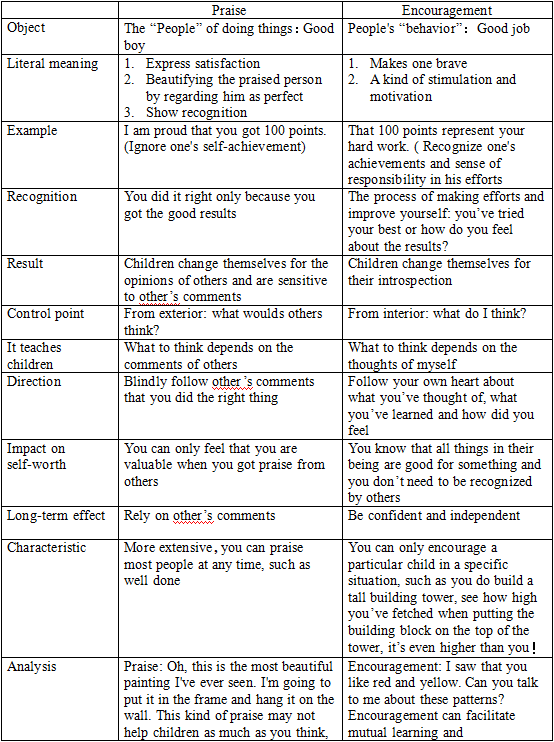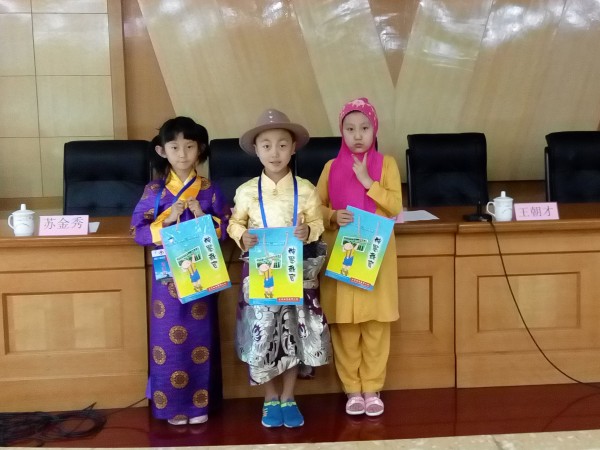SHENMO MOTTO: Virtue & Wisdom

-
Encourage, Instead of Praising
2018-12-25 丨
The writer is from the Ministry of culture development

With the popularization of the concept of scientific education, more and more people begin to understand that education should be direction-oriented rather than criticism-dominating. Some people mistakenly believe that a positive direction for children, whether encouragement or praise, is correct. But is it true?
Although both are positive, there is a big difference between encouragement and praise. Jane Nielsen, the American educator, summarized some educational perspectives, as shown in the following form:

Encouragement teaches children to believe in themselves and recognize their ability to do the right things. Praise teaches children to rely on the external judgment of others, rather than believing in themselves. As Educator Jane Nielsen said in her books:
"When I was a child, I got praise rather than encouragement. At that time, my mother often praised me in front of others, saying that her daughter was perfect, obedient, and sensible. I was greatly motivated, so I tried my best to do chores and learn. Therefore, I could not do things well until I got praise from an early age.
Encouragement or praise, which one did you choose? Encouraging children to evaluate themselves can make them recognize themselves. And children will think back how do they make it simultaneously, such as “How much did I gain?”.
Relying on others’ evaluation will make children flattering and sensitive to others' comments. In that way, children are easy to form a wrong view that once others do not praise them, they will deny themselves and feel that they are not good enough.
In the idea of Shenmo, there is an emphasis on “appreciation”, “concern” and “encouragement”. We must be good at discovering, objectively recognizing and daringly encouraging the bright spots on children to promote their growth. Similarly, for the principals, the same is true for helping teachers grow. The stars are shining, not for the praise of others, but for their desire to grow.
Blurting-out praise is inferior to sincere encouragement. Because only encouragement shows true concern and heartfelt recognition, which does great help to personal growth.
Although both are positive, there is a big difference between encouragement and praise. Jane Nielsen, the American educator, summarized some educational perspectives, as shown in the following form:

Encouragement teaches children to believe in themselves and recognize their ability to do the right things. Praise teaches children to rely on the external judgment of others, rather than believing in themselves. As Educator Jane Nielsen said in her books:
"When I was a child, I got praise rather than encouragement. At that time, my mother often praised me in front of others, saying that her daughter was perfect, obedient, and sensible. I was greatly motivated, so I tried my best to do chores and learn. Therefore, I could not do things well until I got praise from an early age.
Encouragement or praise, which one did you choose? Encouraging children to evaluate themselves can make them recognize themselves. And children will think back how do they make it simultaneously, such as “How much did I gain?”.
Relying on others’ evaluation will make children flattering and sensitive to others' comments. In that way, children are easy to form a wrong view that once others do not praise them, they will deny themselves and feel that they are not good enough.
In the idea of Shenmo, there is an emphasis on “appreciation”, “concern” and “encouragement”. We must be good at discovering, objectively recognizing and daringly encouraging the bright spots on children to promote their growth. Similarly, for the principals, the same is true for helping teachers grow. The stars are shining, not for the praise of others, but for their desire to grow.
Blurting-out praise is inferior to sincere encouragement. Because only encouragement shows true concern and heartfelt recognition, which does great help to personal growth.

-
NEXT:
Knowledge or Creativity --Learning Theory in the Information Age On Jan 08, 2019 >
LATEST

- First Online Shenmo Training for Ru On Mar 29, 2021

- Online Shenmo Entrepreneurship Exchange Meeting On Mar 29, 2021

- First Shenmo Online Abacus Mental M On Feb 03, 2021
EVENTS
Combination of Traditional Culture and Mo On Jun 02, 2020
Shenmo News:Shenmo Nigeria Abacus Mental On Oct 23, 2019
Shenmo News:The delegation of the 1st On Oct 21, 2019







